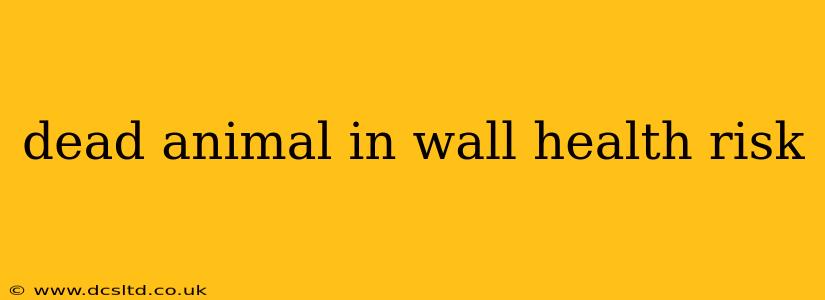Discovering a dead animal in your wall is unpleasant, to say the least. Beyond the yuck factor, however, lies a legitimate concern about potential health risks. This comprehensive guide will address those concerns and provide you with the necessary information to handle this situation safely and effectively.
What are the health risks of a dead animal in the wall?
The primary health risk associated with a decomposing animal in your wall stems from the bacteria, viruses, and parasites it harbors. As the animal decomposes, these pathogens can become airborne, potentially leading to respiratory problems like:
- Infections: Bacteria like Salmonella and E. coli, along with various fungi, can contaminate the air and cause respiratory infections.
- Histoplasmosis: This is a serious fungal infection that can develop from inhaling spores released by decaying organic matter, including animal carcasses. Symptoms range from mild flu-like illness to severe pneumonia.
- Hantavirus: While less common, hantaviruses are carried by rodents, and their droppings can pose a risk if disturbed.
Beyond respiratory issues, the smell itself can trigger nausea and headaches in sensitive individuals. Furthermore, the decaying matter can attract other pests, further complicating the problem.
How long does it take for a dead animal to decompose in a wall?
The decomposition time varies significantly based on several factors:
- Size of the animal: Larger animals take longer to decompose.
- Species of the animal: Different species decompose at different rates.
- Ambient temperature and humidity: Warmer and more humid conditions accelerate decomposition.
- Wall construction materials: Porous materials allow for faster decomposition and increased spread of odors.
Decomposition can take anywhere from a few weeks to several months, depending on these variables. However, the unpleasant odor often becomes noticeable much sooner.
What are the signs of a dead animal in the wall?
Recognizing the signs early is crucial. Common indicators include:
- A persistent foul odor: This is often the first and most obvious sign.
- Visible insects or flies: These pests are attracted to decaying matter.
- Discoloration or staining on walls: Decomposition fluids can seep through the wall, leaving stains.
- Unusual sounds: Sometimes, you might hear scratching or rustling sounds within the wall.
How do I get rid of a dead animal in the wall?
This is not a DIY job for the faint of heart or those lacking proper safety equipment. It’s vital to contact a professional pest control or animal removal service. They have the expertise and equipment to safely remove the carcass, decontaminate the affected area, and repair any damage. Attempting to remove the carcass yourself could exacerbate the problem and increase your exposure to potential health hazards.
What should I do if I find a dead animal in my wall?
- Ventilate the area: Open windows and doors to improve air circulation.
- Avoid direct contact: Do not attempt to remove the carcass yourself.
- Contact a professional: Call a reputable pest control or animal removal service.
- Document the situation: Take photos and videos to provide to the professionals.
- Follow their recommendations: Adhere to any post-removal cleaning and remediation advice.
Can a dead animal in the wall cause structural damage?
Yes, the decomposition process can cause damage to the wall structure. The fluids from the decaying animal can weaken the wood and other materials, potentially leading to structural instability. Professional remediation often includes repair work to address this damage.
Is it safe to live in a house with a dead animal in the wall?
While you might not experience immediate, severe health effects, the long-term exposure to pathogens from a decomposing animal poses a health risk. It's best to have the situation addressed promptly to mitigate any potential health concerns and prevent further damage. The smell alone can significantly impact your quality of life.
This article provides general information. Always consult with professionals for specific guidance related to your situation. Early detection and professional intervention are key to minimizing health risks and repairing any damage caused by a dead animal in your wall.
